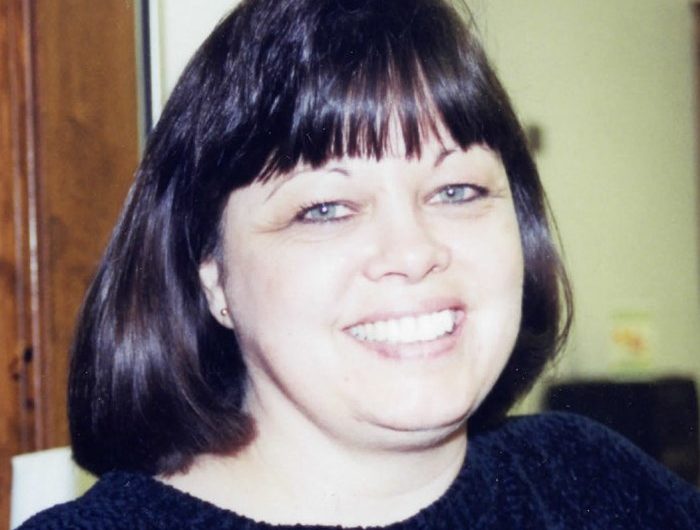 From this Corner
From this Corner
Debbie Scribner: All Heart
FROM THIS CORNER
By
Glenna J. Wallace
DEBBIE SCRIBNER: ALL HEART

“The heart of the matter.” It’s a common phrase, one often heard. “The Heart of the Matter” was the title of a novel by English author Graham Greene in 1948. It is also the title of a song recorded by Don Henley, American rock singer, recorded in 1989. “You’re all heart” is another familiar phrase where the heart is regarded as the center of emotion, sentiment, temperament, kindness, gusto. “Let’s get to the heart of the matter” is still yet another common saying, one often heard, meaning the focal, central, or most important element of a problem, issue, or topic. The topic in this case is Debbie Millhollin Scribner, Eastern Shawnee tribal citizen and the emotion is kindness. She is all heart. When asked if she could have one wish for herself, what that would be, she responded with no hesitation whatsoever, “I want to be a good example. I am a teacher of young children, so I am in a position where I am an example; I want to be a positive example for my students, for their parents and for those around me. I want to be known as having a kind heart.”
The daughter of Maudie Elizabeth Turner and Jasper Charles Millhollin, Debbie was born in Loveland, Colorado in 1956 where she, her four siblings and her parents lived until 1977. Three of the children graduated from high school there in Loveland and the younger two graduated from Wyandotte High School after all five returned to Oklahoma with their parents in 1977. Debbie has four brothers: Billie, Calvin, James and Mark. Living in Colorado came about accidentally. The family was headed to work in the fields in Oregon when their car broke down in Loveland. They had to stay long enough to have the car repaired, found out they liked the area and specifically the town, so they found work and just stayed. Debbie was 21 when she returned to Oklahoma.
Debbie’s first years in Oklahoma were not her happiest years. Married, she became pregnant, the child unfortunately suffered from extreme asthma and passed away at the age of seventeen months. Her streak of bad luck continued as her husband left a week later. Then she was laid off from her job in Neosho, MO where she worked at a chicken plant. That’s when the size of her heart truly began to display its temperament and gusto. She was not a defeatist, never had been and wasn’t going to be one now.
It was now 1980, Buck Captain was Chief of the Tribe and the Tribe was in need of a receptionist. Buck and Debbie talked and at the end of the day she had a new job, a new title. She was now the Eastern Shawnee Tribal Receptionist and Tribal Roll clerk. At that time, there was no 10C. The Eastern Shawnee Tribe was located on 58.19 acres on Oneida Street, West Seneca. On those 58.19 acres were two buildings, one being the original administration building, now named the Chief James Greenfeather Building and the other an incomplete industrial building which ultimately became a Bingo Hall and is now the Annex Building where our Cultural Preservation Department is along with a portion of the Gaming Commission. Then, there was no Bluejacket Building, no Bluejacket Complex.
Debbie fondly remembers those early years. Employees she mentioned included Chief Captain, Robert Alexander, Steve Abernathy, Gayl Tipton, and Marilyn Cummings. She recalls basically no money for anything, employees often chipped in to buy supplies, they personally paid for flowers for co-workers or tribal citizens when they were ill or there was a death, they mowed the yards, and they always worked well with each other. They had no conflict, were always supportive of each other. She remembers two tribal citizens particularly well: Madelyn Dowd and Leonard Bluejacket. She described Madelyn as” the grandmotherly type who loved everyone, spoke her mind, then went back to loving.” Smilingly she recalled Leonard Bluejacket saying that Leonard” couldn’t talk well because of the throat cancer but oh could he write notes and oh how he could shake his fingers. Most of the time he was angry, but still special and he never let his disability slow him down. I will never forget either one of them.” As the years went by, Debbie took on additional duties. In 1989 she became cook at the AOA, ultimately becoming Director where she remained until 2006.
Her personal life was flourishing as well. Spirituality, love, religion are at the center of Debbie Scribner’s life. Wayside Assembly of God Church is at the center of Debbie’s heart. She refers to Wayside Church as” our little church where God has blessed us. At one time it was in such a state of disrepair that it was literally falling in. We made the decision to build a new one. Today under Pastor Danny Burleson, attendance has increased and our Church is paid off. I have always received a blessing each time I entered the church, but now I truly feel blessed as the first thing I see is our pulpit, which was built by my brother James. It is so beautiful. It was there in that little church that the best thing that ever happened in my life occurred. I met Tony Scribner, my husband there.” Tony worked at Eagle Pitcher. Debbie worked at Eastern Shawnee. He was a Christian man; she was a Christian woman. They both supported Wayside Assembly of God Church. They dated for four years, then married then wanted to start their family. They waited—and waited—and waited. That strong heart had to kick in again. If they couldn’t have children themselves, then they were sure there were children somewhere who needed extra love, extra care.
Janie Roark was now working at the tribe and Janie could be persuasive when she grinned that great big smile, batted those eyelashes, and patted your hand. She kept encouraging Debbie to fill out an application to become foster parents through the tribal program. Tony and Debbie were hoping to go through the state and adopt. Adopt. State. Foster Care. Janie. Adopt. State. Foster Care. Janie. Tony and Debbie kept weighing the alternatives. Finally Tony and Debbie concluded the state adoption process might be a long drawn out process whereas the foster care might be faster. Debbie picked up an application one afternoon, filled it out that night, turned it in the next morning and that evening she and Tony had three little boys in their home—three little boys who didn’t remain temporary but became permanent and three little boys who grew up to be full adult responsible individuals.
Debbie says God had a plan for her and Tony all along and just had to be patient with them until they were willing to see, understand and accept that plan. Immediately the five of them became a family and they have remained a family, a family that continues to grow. Robert, the oldest, will be 29 in May and has three children; Michael is 26 with one child and Arthur remains single at 25. That pure heart of Debbie’s is so evident when she smilingly states, “It was my honor to have those boys. I am so blessed that God let Tony and me do that.”
Having the boys when they were young made another opportunity come to fruition for Debbie. She had always wanted to have her own day care business. In 2006 she quit her job as Director of the AOA and opened up her own home day care. After doing that for a few years, she went to Wyandotte Public Schools where she worked, then in 2008 became an aide at the Wyandotte Tribe’s day care, the Turtle Tots. Soon she became a lead teacher and she remains there today in 2019 where she works with the four and five-year olds. She went on to add that she has 18 in her class and 16 of them will be graduating this year, something she is both excited about yet disappointed about as she hates for them to leave. After all, as she reminds me, “my heart is with the children.” She said she especially enjoys the mixture of the youngsters, as only five of the eighteen are Wyandotte tribal members.
When asked about our tribe today, Debbie says she is so excited about our Learning Center, stating it was and is so badly needed. She also praised the tribe for “looking out for tribal citizens. There is no doubt about it, the Eastern Shawnee Tribe does more for its citizens than any other tribe in Ottawa County. And I am so proud that we are making efforts to teach, learn our language. I went to work one day so proud, holding up one of our language books we had produced and excitedly shouted, ‘Look at this. Look at what my tribe has done. ‘ Awesome! I do have one disappointment however. I wish there wouldn’t be so much conflict and that we could work together for the betterment of the tribe. In fact my one wish for all of society would be that we could treat each other the way we want to be treated.”
Debbie Scribner has a way of “getting to the heart of the matter.”